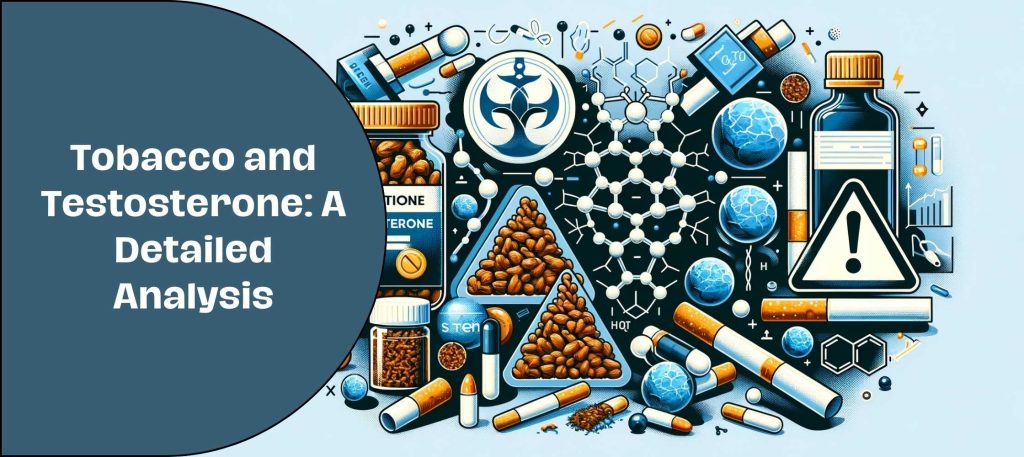|
Getting your Trinity Audio player ready...
|

Picture this: a group of friends, discussing health over coffee, and someone asks, “Hey, does smoking tobacco actually increase testosterone levels?” This question, often shrouded in urban myths and hearsay, touches on a topic that’s both fascinating and critical to understand. In this blog, we’ll dive into the complex relationship between tobacco use and testosterone levels. Let’s unravel this intriguing subject together!
Overview of Testosterone
Testosterone, often hailed as the ‘male’ hormone, is a key player in both men’s and women’s bodies. It’s not just about muscle mass or libido; testosterone plays a crucial role in overall health, affecting everything from bone density to mood. Interestingly, the story of testosterone is full of twists and turns, with many factors influencing its levels in our bodies.
Tobacco Use in the U.S.: A Brief Overview
In the U.S., tobacco use remains a prevalent health concern. With various forms of consumption like smoking, chewing, and the increasingly popular vaping, understanding its impacts is more crucial than ever. But beyond the well-known risks—lung cancer, heart disease, and more—how does tobacco interact with something like testosterone?
Scientific Perspective: Tobacco’s Impact on Testosterone
Recent studies shed light on this intriguing question. Research published in PubMed indicates that smokers actually had higher levels of total testosterone (TT) and free testosterone (FT) compared to non-smokers. However, a key finding was that these levels negatively correlated with the amount of tobacco exposure. In other words, more tobacco led to lower testosterone levels.
This paradoxical finding suggests that while initial tobacco use might elevate testosterone, prolonged or heavy use could have the opposite effect. Moreover, these studies highlight that tobacco’s influence on testosterone is a complex interplay that warrants further research to understand the underlying biological mechanisms and clinical significance of these associations.
Other Factors Influencing Testosterone
While tobacco use and its impact on testosterone levels are important, it’s just one piece of a larger puzzle. Let’s talk about other key players in this game. Diet, for instance, plays a critical role. Picture a plate full of lean proteins, healthy fats, and greens – this isn’t just a fitness guru’s lunch; it’s a testosterone-friendly meal. Regular exercise, especially strength training, is another boost for testosterone levels. Imagine the feeling of lifting weights and how it not only builds muscle but also potentially boosts your hormone levels.
Then there’s stress – the silent hormone disruptor. Ever noticed how a stressful week at work can leave you feeling out of sorts? That’s cortisol (the stress hormone) possibly messing with your testosterone.
Debunking Myths and Misconceptions
Now, let’s clear the air on some common myths. “Smoking makes you more manly with higher testosterone” – sounds familiar, right? Well, as we’ve seen, the reality is more complicated. And remember, higher testosterone from smoking isn’t necessarily a ticket to better health; it comes with a baggage of health risks.
Health Considerations and Quitting Tobacco
We’ve talked a lot about testosterone, but let’s not forget the broader picture. Smoking tobacco is like playing with fire when it comes to your health – lung issues, heart diseases, you name it. If you’re thinking about quitting, remember it’s never too late. There are plenty of resources out there, from nicotine patches to support groups. Picture a smoke-free life – it’s not just good for your testosterone but your overall health.
Conclusion
As we wrap up, remember that the question of tobacco and testosterone is more than just a simple yes or no. It’s a complex interplay that reminds us of the delicate balance of our body’s systems. Whether you’re a smoker, a non-smoker, or someone in between, understanding these nuances can empower you to make informed decisions about your health. So, next time you’re sipping coffee with friends and this topic comes up, you’ll have more than just anecdotal tales – you’ll have a story backed by science.
What’s your take on this topic? Have you experienced any changes in health due to smoking or quitting? Share your stories and let’s keep the conversation going!
- Unlocking Els Pet: A Comprehensive Guide For New Purchasers - August 9, 2024
- Laser Hair Removal Costs in the US – Complete Guide - April 13, 2024
- Quinoa for Weight Loss – Effective Tips & Healthy Recipes - April 1, 2024
